How does deep listening to nature promote biodiversity and a deeper relationship with the natural world?

We discuss the book THE SOUNDS OF LIFE: How Digital Technology Is Bringing Us Closer to the World of Animals and Plants. [ dur: 34mins. ]
- Karen Bakker ( 1971 – 2023 ) was Professor of Geography and Associate at the Institute for Resources, Environment, and Sustainability at the University of British Columbia. She was Visiting Professor at Harvard University’s Radcliffe Institute for Advanced Study. She was the author of Smart Earth: A meta-review and implications for environmental governance, The human right to water revisited (in The Right to Water), and THE SOUNDS OF LIFE: How Digital Technology Is Bringing Us Closer to the World of Animals and Plants.
Professor Karen Bakker passed away on August 14, 2023 after a brief illness.
References to clips of nature sound recordings included in the interview with Karen Bakker :
The American Thanksgiving story is one of cooperation and coexistence between white European settlers and the native peoples. But the real story is much darker.
How does this Thanksgiving narrative get the history wrong?
We discuss the history, the memory, and the meaning of Thanksgiving in the contemporary relationship between the United States and Indigenous people. [ dur: 24mins. ]
- Robert J. Miller is Professor of Law at Sandra Day O’Connor College of Law. He is Interim Chief Justice at Pascua Yaqui Tribe Court of Appeals. He is the author of American Indian Sovereignty versus the United States (in Handbook of Critical Indigenous Studies) and A Promise Kept: The Muscogee (Creek) Nation and McGirt v. Oklahoma. You can access the Scholars’ Circle interview on the book A Promise Kept here . He is an enrolled citizen of the Eastern Shawnee Tribe.
This show was recorded November 27, 2022.
This program is produced by Ankine Aghassian, Doug Becker, Mihika Chechi and Sudd Dongre.
Podcast: Play in new window | Download
Subscribe: RSS
